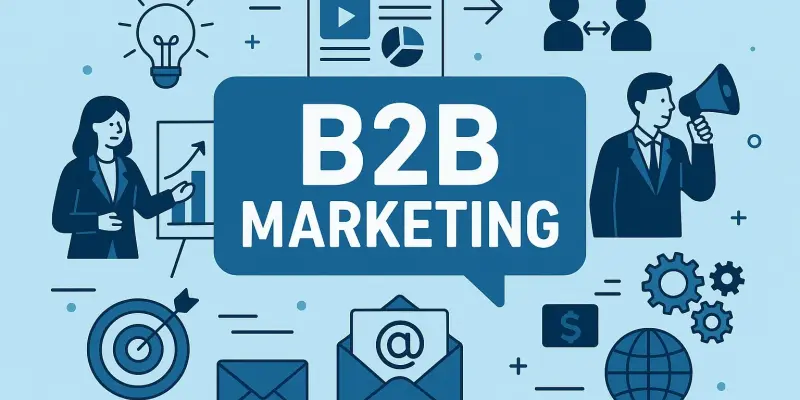The rapid adoption of artificial intelligence (AI) is reshaping the landscape of B2B marketing, creating vast opportunities and challenges. As AI technology evolves, it promises to redefine marketing strategies, offering businesses new tools to engage more effectively with target audiences. However, the integration of AI is not uniform across the industry. Small to medium-sized businesses (SMBs) and larger enterprises are approaching AI utilization differently, resulting in varying degrees of success. For SMBs, even with limited resources, strategic investments in AI have surprisingly led to higher margins. Larger enterprises, while having access to more advanced technology, often face inefficiencies in utilizing these resources to their full potential. This disparity highlights a critical gap within B2B marketing that both industry leaders and emerging players must address.
The Workforce Transformation and Skill Evolution
AI is not solely about technology; it heralds a significant shift in the workforce landscape, demanding adaptation from professionals in the field. With the rise of AI, there’s an evolving consensus that it’s a catalyst for job transformation rather than mere replacement. Predictions indicate a growing emphasis on reskilling, with over 60% of industry professionals recognizing the need to enhance traditional skills with AI proficiency. The concept of hybridization, blending AI capabilities with human intelligence, is gaining traction as businesses adapt to new demands. However, there remains a segment of skeptics—approximately 13%—who anticipate AI replacing jobs, especially within specific sectors like Health & Life Sciences. This apprehension underscores the importance of a guided transition, addressing fears with informed strategies and education.
Essential skills for marketers are set to shift significantly by 2030. Mastery of AI tools will become a fundamental requirement, alongside strategic thinking, ethical decision-making, and the art of storytelling. These skills are not standalone. They require an integration that allows marketers to leverage AI effectively while maintaining an authentic human touch in their campaigns. Therefore, an industry-wide shift is imperative, focusing on overcoming existing skill gaps. Organizations are called to action to develop ethical frameworks, foster interdisciplinary AI teams, and invest in comprehensive AI literacy programs. These measures are vital to equip the workforce with the necessary competencies, ensuring the responsible and efficient deployment of AI in B2B marketing.
Navigating the AI Integration in B2B Marketing
Navigating AI integration within B2B marketing involves overcoming several challenges that organizations must strategically address. The technology is not merely an enhancement; it necessitates a systemic change in how marketing operations are designed and executed. The report from Conveyor Marketing Group outlines essential steps companies should take to harness AI’s full potential. Among these is the need to establish ethical guidelines that address concerns around data privacy and decision-making transparency. Creating interdisciplinary teams that combine technology, ethics, and marketing expertise is crucial for providing a holistic approach, ensuring diverse perspectives enlighten AI’s application. Moreover, businesses must foster a culture of continuous learning and innovation, where AI literacy is not just a technical requirement but a core component of organizational strategy. Conveyor supports this transition by offering resources such as comprehensive playbooks that guide companies in implementing AI productively. These resources serve as strategic manuals, assisting businesses in navigating the complexities of AI adoption while aligning it with their unique objectives. In this context, AI is envisioned as a partner in innovation, working alongside human talent to drive creativity and deliver unprecedented value in B2B marketing landscapes. Such a partnership promises breakthroughs, paving the way for more intelligent and responsive marketing solutions that cater to evolving market demands.
A Collaborative Future Between AI and Human Talent
AI isn’t just a technological advancement; it’s ushering in a notable shift in the workforce, requiring professionals to adapt. As AI emerges, it’s primarily viewed as a driver for job transformation rather than pure replacement. Predictions show that over 60% of industry insiders see a need for reskilling, upgrading traditional skills with AI expertise. The concept of hybridization—melding AI with human insight—is gaining popularity as businesses adjust. Yet, about 13% remain skeptical, expecting AI to replace jobs in specific areas like Health & Life Sciences. This concern highlights the need for a well-structured transition with informed strategies and education to alleviate fears.
By 2030, essential marketing skills will evolve dramatically. Mastery of AI tools will be crucial, along with strategic thinking, ethical decision-making, and storytelling. These skills need integration so marketers can use AI effectively while preserving human authenticity. The industry must tackle skill gaps by developing ethical frameworks, supporting interdisciplinary AI teams, and investing in AI literacy programs to ensure AI’s responsible use in B2B marketing.

